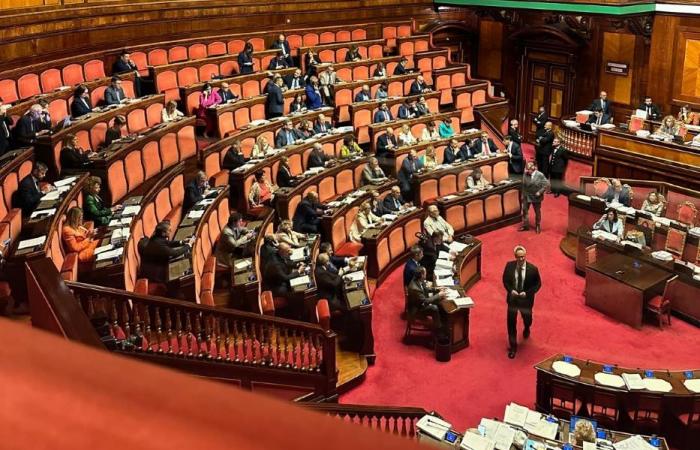With 109 yes votes, 77 votes against and one abstention, the Senate gave the first green light to the constitutional reforms which contain the direct election of the Prime Minister. A result greeted with enthusiasm by Prime Minister Giorgia Meloni: «The reform of the premiership passes to the Senate. A first step forward to strengthen democracy, give stability to our institutions, put an end to palace games and restore citizens’ right to choose who governs them.”
However, this first vote suffered after last week’s brawl at Palazzo Madama and at the same time as the protest demonstration that the opposition and associations organised. It is no coincidence that, immediately after the green light, the Minister for Relations with Parliament, Luca Ciriani, hoped that «for the next steps of examining the measure the opposition parties will decide to change their attitude and give life to a real dialogue in the sole interest of Italians”.
What is the premiership?
It is a bill that modifies 4 articles of the Constitution to introduce the principle of direct election of the Prime Minister in Italy, allowing citizens to directly express their preference for the head of government. The Italian Constitution, in fact, today provides that in political elections citizens elect the members of Parliament, who then in turn express their preference for a government and a Prime Minister.
How would the premiership work?
If the reform reached final approval, the head of government would no longer receive the role from the President of the Republic on the basis of possible majorities in Parliament. The citizens would directly choose the prime minister, in an election that will be held together with that for the members of Parliament. The prime minister would remain in office for 5 years. Mandates are another crucial aspect touched upon: the proposal sets the maximum limit of two consecutive legislatures, in order to avoid the perpetuation of a single government and encourage political turnover. However, a third mandate is possible if the politician/premier has held office for a period of less than 7 years and six months in the previous two.
How would the prime minister be elected?
The text does not specify how. The point is postponed to a subsequent ordinary law which will have to regulate the electoral system. However, the “prize on a national basis, which guarantees a majority of seats in each of the Chambers”, enters into the Constitution. The initial text set the premium at 55%, but it was later removed. The Casellati bill does not clarify whether there will be a run-off between the top 2 prime ministerial candidates and whether a threshold of at least 50% will be set: everything is deferred to the electoral law.
How does trust and the appointment of ministers work?
It is the President of the Republic who gives the elected Prime Minister the task of forming the government; and appoints and dismisses ministers, upon his proposal. Compared to the current Constitution, the novelty is precisely the power of dismissal of ministers. Within 10 days of its formation the government presents itself to the Chambers to obtain their confidence. If the motion of confidence is not approved, the President of the Republic renews the office of the elected president, who can make a new attempt with another team of ministers or even seeking another majority. “If even in this last case the government does not obtain the confidence of the Chambers, the President of the Republic dissolves the Chambers”, is the next passage of the text.
How are government crises regulated?
If the government, during the legislature, is given a vote of no confidence “through a reasoned motion, the President of the Republic dissolves the Chambers”. Case two: in the event of the resignation of the elected prime minister, for example after a no-confidence vote on a key government law, he can propose, within seven days, the dissolution of the Chambers to the President of the Republic, who orders it. The most debated passage is the following: “If he does not exercise this faculty and in cases of death, permanent impediment, forfeiture, the President of the Republic can confer, only once during the legislature, the task of forming the government on the President of the resigning Council or to another parliamentarian elected in liaison with the Prime Minister”. In both cases the new government may have a different majority than the one that emerged at the polls. But the Prime Minister can therefore only be replaced once in the legislature by a parliamentarian who is part of the same coalition that won the elections. It is the rule that effectively erases technical or “broad-based” governments, such as those of Monti and Draghi.
Is the “white semester” still alive?
No. The rule that prevented the dissolution of the Chambers in the last 6 months of the head of state’s mandate has been abolished: it will instead be possible when the dissolution “constitutes a due act”, i.e. it is requested by the no-confidence or resigning prime minister.
How do the powers of the head of state change?
First of all, the Casellati bill repeals the power of the Quirinale to appoint 5 senators for life (those currently in office retain their position). Only the presidents of the Republic will become senators for life at the end of the seven-year term. To elect the head of state, a quorum of two thirds of the electors is needed, no longer in the first three ballots, but in the first six: the absolute majority will therefore be sufficient from the seventh. Furthermore, the countersignature of the government in a series of acts of the President of the Republic is abolished: appointment of the Prime Minister, appointment of judges of the Constitutional Court, granting of pardons and commutation of sentences, the decree calling for elections and referendums , messages to Parliament and the referral of laws to the Chambers.






